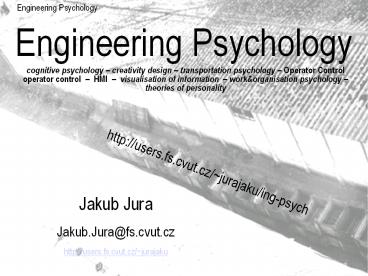Engineering Psychology - PowerPoint PPT Presentation
Title:
Engineering Psychology
Description:
Engineering Psychology Engineering Psychology cognitive psychology creativity design transportation psychology Operator Control operator control HMI ... – PowerPoint PPT presentation
Number of Views:74
Avg rating:3.0/5.0
Title: Engineering Psychology
1
Engineering Psychology
Engineering Psychology
- cognitive psychology creativity design
transportation psychology Operator Control
operator control HMI visualisation of
information workorganisation psychology
theories of personality
http//users.fs.cvut.cz/jurajaku/ing-psych
Jakub Jura Jakub.Jura_at_fs.cvut.cz http//users.fs.c
vut.cz/jurajaku
2
Course website
- http//users.fs.cvut.cz/jurajaku/ing-psych/
3
What is Psychology?
- Psychology is the science of behavior and mental
processes. - Disciplines
- General Psychology
- Social Psychology
- Developmental Psychology
- Psychology of Personality
- Psychometrics
- Psychosemantics
- Clinical PsychologyPsychotherapy
4
What is Engineering psychology?
- Psychological approach to the solution of
technical problems. - Engineering Psychology is mutidisciplinary science
. - Engineering Psychology is concerned with adapting
the equipment and environment to people, based
upon their psychological capacities and
limitations (Blum, 1952) - Roots
- Army psychology
- Ergonomics
- Transportation psychology
- Personnel psychology
- Experimental psychology
5
Problems
Creative design (inventions, innovations)
aviation (altimeter - misreading error )
munitions factories (First World War)
- Human resources
- Testing - Selecting
- Training
Adaptation of technical equipments to human
operator
nuclear industry (Cernobyl, Three Mile Island )
transportation (speed merchant)
Artificial intelligence (MAS, UNS)
6
Sylabus
- Engineering psychology fundamentals (history,
principles, applications). - Casuistics of use some use of engineering
psychology. - Bionics fundamentals (classic cases and
applications). - Cognitive science fundamentals - a demonstration
of a multidisciplinary approach in science. - Basic knowledge of psychology and philosophy of
integrated CS (mind-body problem, cognitive
psychology, structuralism, gestaltism). - Basic knowledge of linguistics and neuroscience
integrated in CS (neuropsychology of language
functions, biolingvistics). - Multiagent systems (the path from a centralized
to a distributed approach). - Knowledge ontology of multiagent systems.
- Holonic systems (the path from the multi-agent
approach to the holonic problems, production
fractaling). - System approach and system dynamics and
deterministic chaos. - Emergent phenomena and the possibility of their
synthesis. - Fractal theory as a solution to the problem of
part / whole (introduction to theories and their
applications). - The overarching theory of philosophy of science
(introduction to the basic philosophical systems
that deal with scientific knowledge).
7
Ideas
- General Psychology
- Transportation Psychology
- Operator Control
- Reaction time
- (reaction time to stimuli and attention payd to
the another stimuli) - Psychology in AI
- Methodology of Research
- Measuring of the time estimation due different
activities - Creativity and innovation
8
Sylabus
- Introduction
- General psychology Cognition
- General psychology Emotions
- Operator Control
- Transportation Psychology
- Methodology of Research
- Psychology in AI
- Creativity and innovation
9
Schedule
- Terms Wednesday Lectures from 1315 to
1445 Lab Afrom 1315 to 1445, Lab A from
1500 to 1630. Place lab 109, Dejvice - 13.2. - Introduction, Cognitive psychology I
(Lecture) 20.2. - Cognitive psychology II,
Psychology of emotions and motivation
(Lecture). 27.2. - LAB 1 - General
psychology 6.3. - LAB 1 - General
psychology 13.3. - LAB 1 - General
psychology 20.3. - LAB 1 - General
psychology 27.3. - Operator Control
(Lecture) 3.4. - LAB 2 - Engineering
psychology 10.4. - LAB 2 - Engineering
psychology 17.4. - LAB 2 - Engineering
psychology 24.4. - LAB 2 - Engineering
psychology 9.5.(Fr.) - Final test 14.5.(Th.) -
Creative design (Lecture)
10
LAB Schedule
LAB 1 - General psychology LAB 1 - General psychology LAB 1 - General psychology LAB 1 - General psychology LAB 1 - General psychology
Task 27.2. 6.3. 13.3. 20.3.
Afterimage G1 G4 G3 G2
Skin sensitivity G2 G1 G4 G3
Weber law G3 G2 G1 G4
Fechner law G4 G3 G2 G1
LAB 2 - Engineering psychology LAB 2 - Engineering psychology LAB 2 - Engineering psychology LAB 2 - Engineering psychology LAB 2 - Engineering psychology
Task 3.4. 10.4. 17.4. 24.4.
Reaction time G1 G4 G3 G2
Indicator evaluation G2 G1 G4 G3
EDA G3 G2 G1 G4
Car driver analysis G4 G3 G2 G1
11
Model of humane operator control
Operator
Sensoric processes
Motoric processes
Internal proceses
Sensation Perception
Behaviour, Motoric func.
Thinking, decision making, problem solving.
Handlers
Pilot lamps
Controled system
Aktors
Sensors
Functionla principles of controled sys.
12
Cognitive model of the operator































